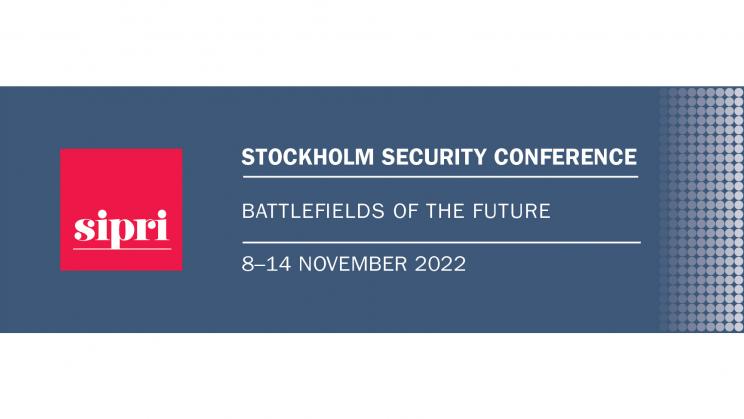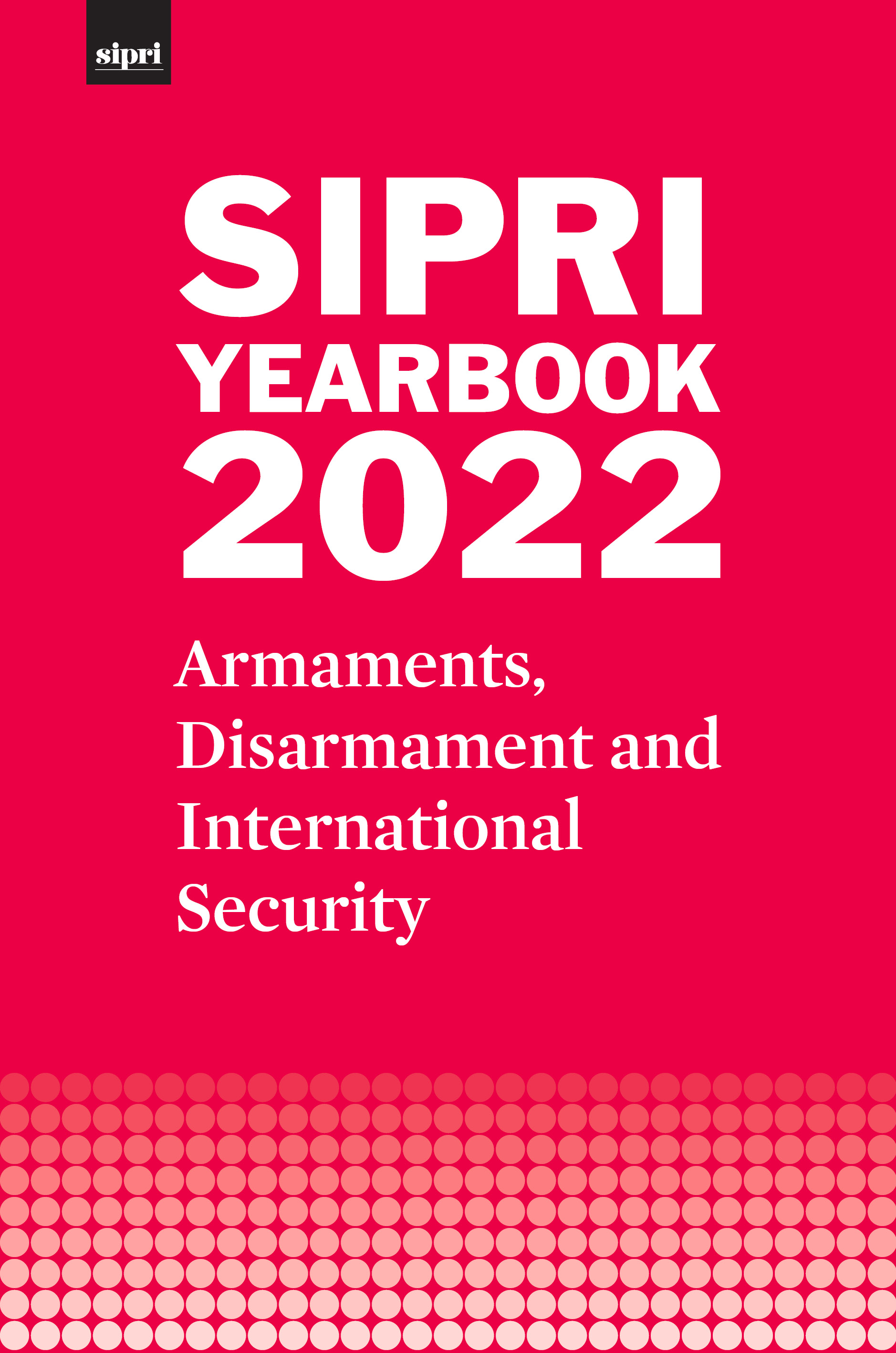|
| NEWS |
 |
| 2022 Stockholm Security Conference—registration now open |
|
Register today for the seventh edition of the Stockholm Security Conference, held on the theme ‘Trends of Conflict and Warfare in the 21st Century: Effects and Impact of the War in Ukraine’. The conference will convene in a virtual format on 8–14 November and continues a series on the theme ‘Battlefields of the Future’ against the backdrop of the war in Ukraine.
|
|
|
Register | Read more | Browse the programme | Watch the SSC21 sessions
|
|
|
 |
| How culture is helping to restore peace–New film and interview series from the Nineveh Plains |
|
The Islamic State occupied the Nineveh Plains between 2014 and 2017. Today, the region is struggling to rebuild its infrastructure, homes and agriculture-based economy. Substantial reconstruction and reconciliation efforts are needed to address the social, cultural and economic impacts of the Islamic State occupation. A new film and interview series highlights that post-conflict reconstruction involves more than simply rebuilding the physical infrastructure and the economy or establishing formal power-sharing arrangements. It stresses the importance, for the healing process, of restoring minority communities’ ability to observe their cultural and religious practices.
|
|
|
Read more | Watch the videos
|
|
|
 |
| SIPRI hosts online workshop on naval incident management |
|
On 28–29 September, SIPRI hosted an online expert workshop on ‘Promoting a Free and Open Indo-Pacific: Naval Incident Management in Asia and Europe’. The workshop was held in a virtual format over two half-days and brought together more than 20 academic, legal and technical experts from China, Europe, Japan, South East Asia and the United States. Online observers had the opportunity to learn from the experts’ experiences in exploring a more comprehensive naval incident management mechanism.
|
|
|
Read more
|
|
|
 |
| SIPRI hosts roundtable on China’s Afghan footprint in a post-US withdrawal environment |
|
As a part of a wider project examining China’s evolving interests and footprint in Afghanistan post-US withdrawal, SIPRI hosted an online roundtable discussion on 22 September. The half-day, closed-door discussion convened experts from Afghanistan, China and Europe to discuss and explore whether and how China might play a constructive role in a Taliban-led Afghanistan, and propose recommendations for regional, economic and political stability. The final findings and project report will be available in December 2022.
|
|
|
Read more
|
|
|
 |
| SIPRI Yearbook 2022 summary now available in seven languages |
|
Thanks to SIPRI’s translation partners, the summary of SIPRI Yearbook 2022 is now available in Catalan, Dutch, French, Italian, Japanese, Spanish and Swedish. Released in June 2022, the 53rd edition of the SIPRI Yearbook provides cutting-edge information and analysis on developments in armaments, disarmament and international security. It is available in print and online from Oxford University Press.
|
|
|
Read more | Download the summaries | Order SIPRI Yearbook 2022
|
|
|
 |
| SIPRI statement on the 2022 Nobel Peace Prize |
|
SIPRI congratulates Ales Bialiatski, Memorial and the Center for Civil Liberties on the award of the 2022 Nobel Peace Prize, to honour ‘three outstanding champions of human rights, democracy and peaceful co-existence in the neighbour countries Belarus, Russia and Ukraine’. ‘By awarding the Nobel Peace Prize to these three, the Nobel Committee is sending a message that human rights, civil liberties and an active civil society are an integral part of peace. This is impossible to argue with,’ said SIPRI Director Dan Smith.
|
|
|
Read more
|
|
|
|
| COMMENTARY |
 |
| Information challenges for humanitarian response to climate shocks in fragile settings |
|
As climate change intensifies, humanitarian organizations and their field operations will need a better understanding of how climate change interacts with conflict and displacement dynamics, as well as its broader societal impacts. This blog describes how these organizations need accurate and timely information related to climate, weather and natural resources and lays out how long-term information partnerships could provide invaluable data to close information gaps.
|
|
Read the SIPRI WritePeace blog
|
|
|
|
|
|
 |
| External articles and podcasts |
|
The following articles and podcasts by SIPRI experts were recently published:
|
|
|
| UPCOMING EVENTS |
| |
| 14 November 2022 |
| Ukraine, climate, cyber, food—A world of challenges: What next? |
|
On the final day of the 2022 Stockholm Security Conference, SIPRI is pleased to welcome you to a conversation with some of the world’s foremost experts on peace and security to identify potential ways forward given the daunting set of challenges facing the world today.
|
|
Read more
|
|
| RECENT EVENTS |
| |
| 5 October 2022 |
| SIPRI co-hosts climate and security event in the DRC ahead of COP27 |
|
On 5 October, SIPRI and partners hosted a side event at COP27’s preparatory meeting in Kinshasa to address the conflict situation in the Democratic Republic of Congo (DRC) and its links to climate security. The event aimed to foster dialogue by bringing national, regional and international experts together to discuss the challenges of the global climate transition and the risks and opportunities of this transition for countries like the DRC.
|
|
Read more
|
| |
| 12 October 2022 |
| Global food crisis: The ripple effects of the war in Ukraine on the Horn of Africa |
|
Together with the Swedish Ministry for Foreign Affairs and the UN World Food Programme (WFP), SIPRI hosted a discussion at Medelhavsmuseet, Stockholm. The conversation explored the ripple effects of the war in Ukraine on the Horn of Africa, how hunger is threatening peace, stabilization and development gains in the region, and how WFP works with partners to strengthen food systems and end hunger.
|
|
Read more
|
|
| STAFF NEWS |
SIPRI is currently accepting applications for:
- Communications intern, Environment of Peace initiative (Closing date: 6 November).
- (Senior) Researcher, Peace and Development Research Area (Closing date: 13 November).
- Senior Researcher and Programme Director, Arms Transfers Programme (Closing date: 30 November).
|
|
Read more
|
|
|
| PUBLICATIONS |
 |
| The Challenges of Data Collection in Conflict-affected Areas: A Case Study in the Liptako-Gourma Region |
|
Conducting research in the Sahel has become more challenging over the past 10 years, and the continuing deterioration of the security situation has restricted access to many areas. This SIPRI Insights paper provides an overview of the main challenges for researchers when conducting data collection in conflict-affected areas. Using a case study from the Liptako-Gourma region, the paper identifies and outlines how the project addressed specific challenges in this regard. The paper also highlights key considerations for researchers to take into account when carrying out data collection and fieldwork in conflict zones.
|
|
Read the SIPRI Insights on Peace and Security
|
|
|
 |
| Post-shipment On-site Inspections: Multilateral Steps for Debating and Enabling Their Adoption and Use |
|
Among the key tools that states that export arms and military equipment can adopt to help prevent and mitigate the diversion of military materiel are post-shipment on-site inspections. While a growing number of states have adopted and implemented these inspections, their wider use could further help to prevent diversion of military materiel. This SIPRI Policy Paper reviews barriers and challenges in implementing the tool, and looks at what steps can be taken at the multilateral level to expand discussion about post-shipment on-site inspections and help to support those states that are considering adopting this policy tool.
|
|
Read the SIPRI Policy Paper
|
|
|
 |
| Multilateral Peace Operations and the Challenges of Epidemics and Pandemics |
|
This paper provides a broad overview of how multilateral peace operations have responded to cholera and Ebola epidemics and the HIV/AIDS and Covid-19 pandemics over the past 20 years. Such public health crises can be especially lethal in fragile and conflict-affected areas. The paper examines the ways that peace operations directly or indirectly have given support to epidemic/pandemic response measures and considers arguments against and in favour of more strategic involvement of peace operations in future epidemics and pandemics.
|
|
Read the SIPRI Background Paper
|
|
|
 |
| Retaining Human Responsibility in the Development and Use of Autonomous Weapon Systems: On Accountability for Violations of International Humanitarian Law Involving AWS |
|
It is undisputed that humans must retain responsibility for the development and use of autonomous weapon systems (AWS) because machines cannot be held accountable for violations of international humanitarian law (IHL). However, the critical question of how, in practice, humans would be held responsible for IHL violations involving AWS has not featured strongly in the policy debate on AWS. This report aims to offer a comprehensive analysis of that very question by exploring how two central frameworks structuring the ascription of responsibility for IHL violations—namely the rules governing state responsibility and individual criminal responsibility—apply to the development and use of AWS.
|
|
Read the SIPRI Report
|
|
|
 |
| Implementation of the Russian Federal Budget during January–July 2022 and Spending on the Military |
|
The Russian government has provided little information on military expenditure during the war with Ukraine that started in late February 2022. However, for a brief period in August and September, the Federal Treasury did issue its usual reports on budget spending during the first half of the year and then to 1 August. The reports are very revealing—and, at first sight, surprising—on actual spending and permit some analysis of the Russian government’s commitment of resources to what it has termed a ‘special military operation’.
|
|
Read the SIPRI Background Paper
|
|
|
 |
| NewSpace and the Commercialization of the Space Industry: Challenges for the Missile Technology Control Regime |
|
NewSpace actors entering the space industry are not only changing the nature of the industry but are also exacerbating existing missile proliferation risks and posing challenges for the effective implementation of export controls. It therefore requires a coordinated response by the main multilateral missile export control instrument: the Missile Technology Control Regime (MTCR). This report identifies developments, trends and possible proliferation scenarios linked to the NewSpace industry that pose possible missile proliferation risks and challenges for MTCR export controls.
|
|
Read the SIPRI Report
|
|
|
 |
| Arms-production Capabilities in the Indo-Pacific Region: Measuring Self-reliance |
|
Armed forces in the Indo-Pacific region remain dependent on weapon systems imported from foreign suppliers. This is despite the efforts of many governments in the Indo-Pacific to implement policies that support the development of local arms industrial capabilities with the aim of increasing self-reliance. This report develops three indicators to give a score and regional ranking of self-reliance in arms production to 12 jurisdictions in the Indo-Pacific region. Overall, the report contributes to knowledge and debates on armament trends and military modernization in the Indo-Pacific.
|
|
Read the SIPRI Report
|
|
|
 |
| A Practical Guide to State Participation in the UN Report on Military Expenditures |
|
The United Nations Report on Military Expenditures (UNMILEX) is a reporting instrument where all member states can voluntarily provide data on their military expenditures to enhance multilateral transparency in military matters. In recent years, fewer than 50 states on average per year have participated. However, most states release public information on their military spending, which could directly support submissions for UNMILEX. To assist in the revival of the instrument, this Good Practice Guide aims to support officials in preparing their country’s annual submission for UNMILEX. This project was funded by UNSCAR.
|
|
Read the SIPRI Good Practice Guide
|
|
|
 |
| SIPRI Yearbook 2022 |
SIPRI Yearbook 2022 presents a combination of original data in areas such as world military expenditure, international arms transfers, arms production, nuclear forces, armed conflicts and multilateral peace operations with state-of-the-art analysis of important aspects of arms control, peace and international security. In addition to its detailed coverage of nuclear arms control and non-proliferation issues, the latest edition of the SIPRI Yearbook includes
- insight on developments in conventional arms control in 2021;
- regional overviews of armed conflicts and conflict management;
- in-depth data and discussion on military expenditure, international arms transfers and arms production; and
- comprehensive coverage of efforts to counter chemical and biological security threats.
|
|
Browse the contents page | Download the summary (PDF) | Download the sample chapter on world nuclear
forces (PDF) | Order SIPRI Yearbook 2022
|
|
|
| |
|
|
|
|
|
|